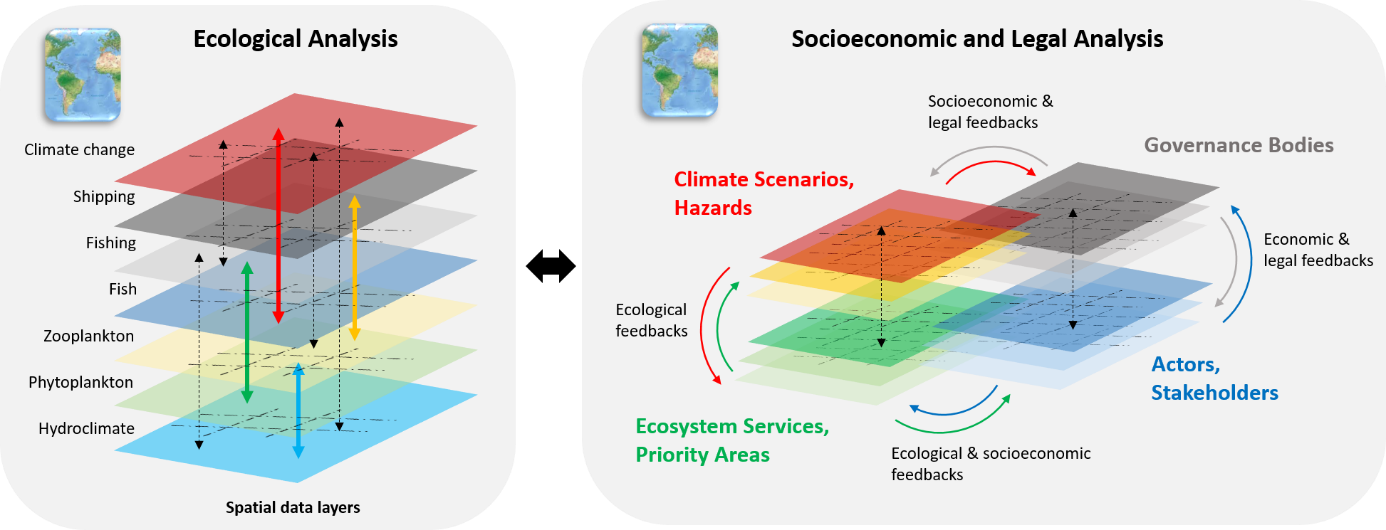IMAPP – Integrative Mapping of Atlantic Protection Areas
IMAPP is part of the BMBF-funded research initiative “Biodiversity in the Blue Ocean” (BBO), which aims to develop new strategies for the conservation of marine biodiversity in areas beyond national jurisdiction—the so-called high seas. These areas make up about two-thirds of the world’s oceans and host a rich and largely unexplored diversity of life. This biodiversity plays a crucial role in maintaining the stability and resilience of marine ecosystems, which are vital for global food security and for buffering the impacts of climate change.
However, biodiversity in the high seas is increasingly threatened by climate change, fishing, and other human activities. In response to this challenge, the United Nations adopted the BBNJ Agreement in 2023, a landmark treaty for the protection and sustainable use of marine biodiversity in international waters. It includes the goal to protect at least 30 percent of the global ocean through Marine Protected Areas (MPAs) by 2030.
IMAPP contributes to this goal by developing science-based decision support tools to identify and prioritise areas for protection in the Atlantic high seas. The project combines ecological modelling, spatial analyses of human uses such as fisheries and shipping, and legal-economic assessments to evaluate which marine areas are particularly valuable or vulnerable. It builds on the concept of Ecologically and Biologically Significant Areas (EBSAs) and supports the development of internationally coordinated strategies for MPA designation under the BBNJ framework.

(A) Ecological analyses include multiple spatial data layers to assess functional diversity and connectivity within and between trophic levels, taking into account anthropogenic pressures and socio-economic demands on spatial planning. (B) Socio-economic and legal analyses incorporate spatial information on the value and vulnerability of ecosystem services, as well as the network of stakeholders and governance bodies, to develop conservation strategies that are both politically and economically balanced.
IMAPP collaborates closely with three other projects within the BBO Cluster—AGELESS, BEnToolsMaPs, and INDIFUN-AI. Together, these projects cover a wide range of organisms and habitats, from plankton to deep-sea ecosystems. The joint goal is to improve our understanding of biodiversity patterns in the "Blue Ocean" and provide concrete recommendations for international conservation efforts. Through close cooperation with national and international stakeholders, the BBO Cluster aims to ensure that scientific findings feed directly into global strategies for protecting marine biodiversity.
IMAPP Partner Institutions:
Institution |
Principal Investigator (PI) |
| Universität Bremen | PD Dr. Holger Auel |
| Helmholtz-Institut für Marine Biodiversität (HIFMB) | Prof. Dr. Thilo Gross |
| Deutsches Zentrum für Integrative Biodiversitätsforschung (iDiv) | Prof. Dr. Martin Quaas |
| Uni Kiel, Center for Ocean and Society (CEOS) | Prof. Dr. Marie-Catherine Riekhof |
| Leuphana Universität Lüneburg | Prof. Dr. Valentin Schatz |
- Dauer: 01.09.2024-31.08.2027
- Projektleitung: Jun.-Prof. Dr. Flemming Dahlke
- Drittmittelgeber: German Federal Ministry of Research, Technology and Space (BMFTR)
